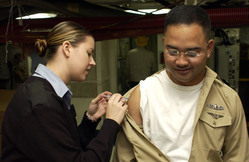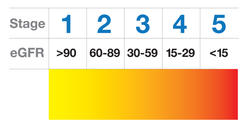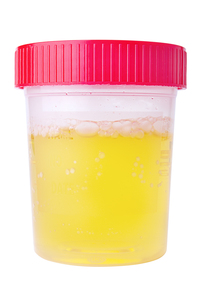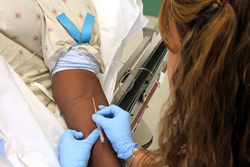Taking Care of Yourself
Most of us don't give a lot of thought to our kidneys if they are working well. But if you are told that you have a kidney problem, all of a sudden your kidneys may be all you can think about!
When you have a chronic health problem, you have a new job. This job is to take care of yourself. Your care team members are experts in kidney problems. But YOU are the expert about you.
Keep a Positive Attitude
There is no question that it's scary to have a kidney problem. A lot of that fear comes from worrying that if your kidneys fail, your life will be over. Not true! People with kidney failure can live for decades with dialysis, kidney transplants, or both. They work, travel, volunteer, and do hobbies.
The first thing you need to know is that you can have a good life, even if your kidneys fail. But, people don't live for years with kidney failure by accident! It takes an active role on your part.
Knowledge is Your Life Raft
Your care team members are experts in kidney problems. But YOU are the expert about you. You are the only one who knows:
- How you feel
- How medicines affect you
- What symptoms you have
And, you are the only one who can take the steps to follow the treatment plan that you work out with your health care team.
You choose what to eat. You choose what to drink. You choose whether and how to take medicines. No one else can do these tasks for you. We call this self-management. And, to self-manage, you need to learn a lot. It's very normal to feel as if you are adrift at sea—but you'll feel better when you find out what's going on and what you can do about it.
Sources of Knowledge for You
Where can you learn what you need to know? The Internet is one source. Try My HealtheVet. There are many other websites.
Your primary care health team can answer your questions, too. Your doctor can refer you to a kidney disease specialist (nephrologist). Or, your doctor can ask questions of a nephrologist and get answers for you.
You may be seen in a special renal clinic ("renal" means kidneys). Or, your VA center may have a clinic for high blood pressure or other health concerns. Others who have kidney problems can also be good sources of knowledge. Just keep in mind that your health and that of someone else with the same problem can still differ.
Your Job: Ask Good Questions
Part of your job is asking good questions.
Before your clinic visit:
- Write down your questions so you can ask them.
- List your questions from most to least important, in case you can't get to them all.
At your clinic visit:
- Write down the answers you get.
- Ask your care team to spell medical terms so you can look them up.
- If you've been doing your homework tell your care team what you know, so they don't have to start at the beginning.
- Don't hold back! If you are not taking your medicines or you use street drugs, your care team needs to know.
It might also help to bring someone with you to clinic visits. An extra pair of ears may help in case you miss something. ASK if something does not make sense to you. Medical terms are hard to understand. It's okay to ask, "can you please say that in plain English?"
Tell your care team what you care about most—don't assume that they know you want to keep your job, or be able to take care of loved ones.
Stages of Chronic Kidney Disease (CKD)
Chronic kidney disease, or CKD, has five stages. These stages tell you about your percent of kidney function and are measured by eGFR (glomerular filtration rate). Your eGFR level is about the same as your percent kidney function. So, if your eGFR is 57, it means that you have about 57% kidney function. Healthy people have an eGFR of 90 or higher. But, it is normal to lose a bit of kidney function with age. As kidney function decreases the eGFR will be lower.
Most people never know if they have stage 1 or even stage 2 CKD. If you are told that you have stage 2 CKD, your doctor's job is to figure out how fast your kidney problem is moving and to slow other problems that CKD can cause. YOUR job is to:
- Take steps to protect your kidneys
- Work with your health care team to try to slow kidney disease
To learn more, visit How to Protect Your Kidneys. There are things you can do!
Get a Urine Test Once a Year
Protein in your urine is an early sign of kidney problems. If you have diabetes, get your eyes and your urine checked each year. Ask your health care team to check your urine for protein. A test for albuminuria can find kidney disease.
If you have protein in your urine, certain blood pressure pills can help protect your kidneys, even if your blood pressure is not high. These pills are in the ACE-inhibitor or ARB class. ACE-inhibitors can cause a dry cough. If this is a problem for you, your doctor can switch you to an ARB instead. To learn more about protein in your urine, visit the Laboratory.
Manage Symptoms and Protect Your Heart
At any stage of CKD, your job is to manage your symptoms and keep your heart healthy, along with your kidneys. The kidneys and the heart work together. Protect your heart AND your kidneys so you can feel your best as long as you can. You can help protect your heart with:
- Exercise
- A heart-healthy diet
- Taking statin drugs to treat high cholesterol (if your doctor prescribes them for you)
If you smoke, quitting helps protect your heart and kidneys, too!
Choose a Treatment
At Stage 4 CKD, your job is to plan ahead. If your kidneys are failing, it's wise to think about your treatment options before you need one. This way, you can choose a treatment that's a good fit for your life and what you like to do.
For now, it may help to know that there are four main options.
- With a kidney transplant, a surgeon gives you one new, healthy kidney from a donor. A transplant can give you a lifestyle that is close to normal—but you need to take medicines to suppress your immune system for as long as the kidney lasts.
- Peritoneal dialysis, or PD, uses the lining of the inside of the belly as a filter. A kidney doctor or surgeon puts in a tube called a catheter. The tube is used to fill the belly with sterile fluid. Wastes and excess water from the blood flow into the fluid, then it is drained and replaced with fresh fluid. PD is easy to learn and do, and is done at home or work, on your own schedule. Most people use a machine to do PD at night while they sleep.
- Hemodialysis, or HD, cleans your blood by taking it out of your body, passing it through a filter, and then bringing it back to you. HD can be done at home or in a clinic, during the day or at night during sleep.
- Medical management without dialysis will treat your pain or other symptoms and give you comfort care. This option does not extend your life, but allows natural death to occur. Hospice services can help you and your family.
To learn more about treatment options, visit the Treatment Room.
Protect Your Veins, Starting Right NOW!
If your kidneys work now, but there is any chance that they could fail one day, protect your veins. You might need them to reach your blood for dialysis (this is called an access).
One type of dialysis access, made of an artery plus a vein in your arm (called a fistula), may be your lifeline. You only have about 10 places on your body where one can be made. So, each one counts!
- Don't allow blood tests on the arm you don't write with. If you must have blood drawn on that arm, see if they can use your hand.
- Avoid IVs (intravenous lines) in the arm you don't write with.
Tell the lab tech that you have kidney problems and are saving your veins for dialysis. Some groups offer a wallet card or bracelet you can show medical staff.
Your Job at Each Stage of CKD
At each stage of CKD, there is something that you can do to improve your health and quality of life. Click here to print a copy of the “Your Role at Different Stages of CKD” chart.
Work with your VA care team and keep doing the steps from the early stages if you move into later ones.
Your Role in Your Kidney Care
- Staying positive, learning all you can, and taking an active role in your care are all part of:
Not scored As someone with a chronic disease it can help you to stay positive, learn all you can, and take an active role in your care by self-managing.
- You can get the most out of your doctor visits if you:
Not scored It’s easy to forget what you meant to ask or what the doctor said. If you bring your questions along and write down the key points, you’ll remember more.
- Steps you can take to protect your heart include:
Not scored Your heart is at risk if you have a kidney problem. But, there is a lot you can do to protect it.
- At stage 4 chronic kidney disease (CKD), it is time to:
Not scored At each stage of CKD, there are steps you can take that can help you to have a better life. Choosing a treatment that is a good fit for your lifestyle can make a big difference for you. You can learn about your options right here in the Treatment Room, and talk with your kidney care team. If you have stage 4 CKD and have not yet chosen a doctor or gotten a urine test, you will need to do these things, too.
- Protect your veins—just in case—by avoiding these things on the arm you don’t write with:
Not scored Just in case you ever need a blood access for hemodialysis, don’t allow blood tests or IVs to be done on the arm you don’t write with.
































